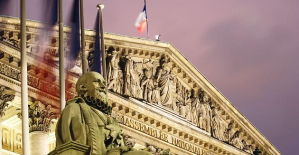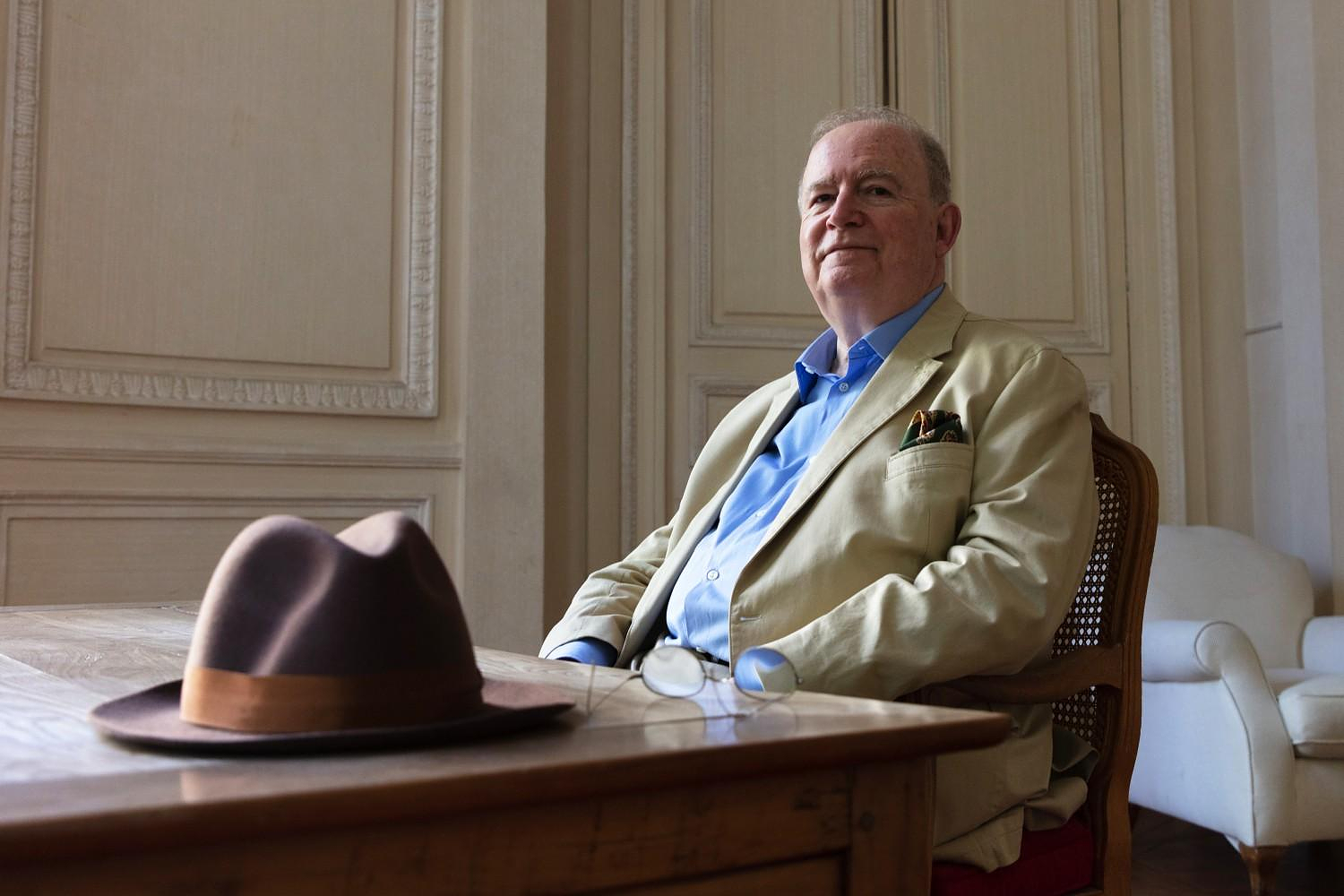The immortals proceeded on Thursday February 8 to the election to the chair of Marc Fumaroli, elected in 1995 and died in June 2020. Were we going to witness a new “blank”, that is to say an election without elected officials. No, the academicians chose the philosopher Christian Jambet, born in Algiers in 1949, internationally recognized specialist in Shiite Islam, associate professor of philosophy, who learned Arabic and Persian. His last published book, The Philosopher and his Guide at Gallimard, in 2021, focused on the figure of Mullâ Sadrâ and philosophical religion (1571-1640), who was nicknamed the first of the metaphysicians. Our collaborator, Paul François Paoli, met him in 2008, on the occasion of the publication of Life and Resurrection in Islam - The Beyond According to Mullâ Sadrâ (Albin Michel). Here is the portrait he painted.
Philosopher, author of around ten books and former student of the orientalist Henri Corbin, Christian Jambet has never done anything to appear in the media. During this period of commemoration of May 68, celebrated by those who wanted to abolish commemorations, he keeps his distance. However, he was more than a witness to May 68: an activist. In 1968, the man who published Life and Resurrection in Islam - The Afterlife According to Mullâ Sadrâ was 19 years old.
Also readCustoms, costumes, mission: five things to know about the French Academy
Born in Algeria, this pied-noir child arrived in Paris in the 1960s and went to get a little red book from the Chinese embassy. China is showing the way to those who believe that the world will tip over to a grandiose dream that will turn out to be bloody. Of this past, Christian Jambet, who receives guests in an office lined with books and paintings, has kept few visible traces. We can clearly see here a small bust of Mao, but overlooked by another bust, this one very large, of Napoleon. And we also see a portrait of Freud, since Christian Jambet was a student of Lacan. One could be ironic, this man was one of all the snobberies of his time... This is not the case. Because Jambet’s great encounter is not ideology: it is philosophy. “A teacher converted me as a teenager, in my final year.” The time was prosperous for radical thinkers. Louis Althusser writes For Marx. There is also Michel Foucault whom Jambet admires.
When May 68 arrived, this khâgne student at Louis-le-Grand did not pass his exams and turned away from the École Normale Supérieure. What’s the point if revolution is imminent? “I fell in love with politics and love at first sight. I was too young to go to the factory like my comrades did,” explains Jambet, who with others founded the Proletarian Left, a movement which calls on young bourgeois people to join the workers and peasants. Having left for China in 1969, at the age of twenty, he met Chou En-lai for the anniversary of the People's Republic of China. “I had a touch of irony, I was playing my role. I had a wonderful interpreter, Buddhist and vegetarian, who had escaped the revolution and was doing a thesis on Flaubert. There is a literary dimension to this era which explains a lot of mistakes.”
Also read: “Previous generations left them an unstructured world”: how May 68 gave rise to Wokism
The hallucinatory adventure of the proletarian left lasted until 1973, the date of the dissolution of the movement. “In the meantime, there had been a strike by the Lip workers and we saw clearly that they didn’t need us.” The Solzhenitsyn affair breaks out. Jambet is upset by The Gulag Archipelago. A myth, that of communism, collapses. Something breaks inside him. “I had the feeling that the seriousness of life was over. I had to occupy the rest of my life.” The discovery of Muslim spirituality will save him from disinheritance. Did his Algerian childhood count in this predilection? Christian Jambet believes it. “France had studied the Muslim world. Despite the injustices of colonization, there had been more than a beginning of understanding between the two cultures.” Jambet read Louis Massignon, discovered the poet Halladj and became passionate about Henri Corbin. He leaves for Iran with him, learns Arabic and Persian. Did he consider converting to Islam, like René Guénon? “To understand means to expatriate. But neither adhesion, nor conversion,” he replies, almost offended...
In 1976, he published, with Guy Lardreau, L'Ange, une ontologie de la revolution, a reflection on the notion of truth in politics. “There is no politics necessary unless there is a relationship with the Truth. Otherwise, politics is just management,” explains this lifelong Platonist. With André Glucksmann, Philippe Nemo and Bernard-Henri Lévy, they form the “squad” of “new philosophers”, according to the expression of Maurice Clavel. The criticism of a certain legacy of May 68 begins. “I am forever at odds with the libertarian heritage of 68; a certain philosophy of the liberation of desire served as a prophetic vision of what we were going to see coming: the unleashing of the reign of the commodity,” asserts Jambet.
Today, he regrets not having met Pierre Boutang, as his friend Clavel urged him, so far from him in political thought, but so close in spirit. “Boutang was a Maurrassian and I was a sectarian! This is my great regret, especially since Maurras was a great thinker.” In politics, Jambet particularly admires Napoleon and de Gaulle, “two men of historical decision-making”. A discreet Christian, he wrote, about the Regensburg speech, a very high-level commentary (The Regensburg Conference, issues and controversies, by Abdelwahab Medeb, Christian Jambet, Jean Bollack, published by Éditions Bayard) on Greek thought, Catholicism and Islam. “The Pope's speech, in no way Islamophobic, was misunderstood.” He adds: “What is best in the land of Islam can be a source of awakening for Western man, who has lost the sense of tragedy.” “Pilgrim of the absolute”, the word of Léon Bloy, which he discovered a few years after Mao, is perhaps not out of place to describe the strange path of this man whose immense erudition rubs shoulders with a disarming simplicity. .

 An American tourist steals a mug of beer from a tavern in Munich and admits it...50 years later
An American tourist steals a mug of beer from a tavern in Munich and admits it...50 years later Madagascar calls for replacement of EU ambassador
Madagascar calls for replacement of EU ambassador Chinese journalist released from prison four years after denouncing China's handling of Covid
Chinese journalist released from prison four years after denouncing China's handling of Covid “Russian law” adopted in Georgia: Europeans alongside the streets
“Russian law” adopted in Georgia: Europeans alongside the streets Suicide attempts and self-harm on the rise among young girls
Suicide attempts and self-harm on the rise among young girls In Europe, 10,000 people die every day from cardiovascular disease
In Europe, 10,000 people die every day from cardiovascular disease Brussels raises Spanish GDP forecasts to 2.1% and foresees a deficit of 3% in 2024
Brussels raises Spanish GDP forecasts to 2.1% and foresees a deficit of 3% in 2024 Inflation rises to 3.3% in April due to gas and food
Inflation rises to 3.3% in April due to gas and food Parisian owners of electric SUVs will have to pay a residential parking rate from October 1
Parisian owners of electric SUVs will have to pay a residential parking rate from October 1 Saint-Denis-Pleyel station, “a little Châtelet north of Paris”, ready to open before the Olympic Games
Saint-Denis-Pleyel station, “a little Châtelet north of Paris”, ready to open before the Olympic Games Comedian Guillaume Meurice, still “banned from the air”, awaits his possible sanction
Comedian Guillaume Meurice, still “banned from the air”, awaits his possible sanction GTA 6: the event video game will be released in fall 2025
GTA 6: the event video game will be released in fall 2025 The Le Bon Air festival deprograms the DJ I Hate Models for a private jet story
The Le Bon Air festival deprograms the DJ I Hate Models for a private jet story A golden reward for Yasmina Reza
A golden reward for Yasmina Reza Cannes: a demonstration of the precarious of cinema above the red carpet
Cannes: a demonstration of the precarious of cinema above the red carpet Magician David Copperfield accused of sexual violence by sixteen women
Magician David Copperfield accused of sexual violence by sixteen women Omoda 7, another Chinese car that could be manufactured in Spain
Omoda 7, another Chinese car that could be manufactured in Spain BYD chooses CA Auto Bank as financial partner in Spain
BYD chooses CA Auto Bank as financial partner in Spain Tesla and Baidu sign key agreement to boost development of autonomous driving
Tesla and Baidu sign key agreement to boost development of autonomous driving Skoda Kodiaq 2024: a 'beast' plug-in hybrid SUV
Skoda Kodiaq 2024: a 'beast' plug-in hybrid SUV The home mortgage firm rises 3.8% in February and the average interest moderates to 3.33%
The home mortgage firm rises 3.8% in February and the average interest moderates to 3.33% This is how housing prices have changed in Spain in the last decade
This is how housing prices have changed in Spain in the last decade The home mortgage firm drops 10% in January and interest soars to 3.46%
The home mortgage firm drops 10% in January and interest soars to 3.46% The jewel of the Rocío de Nagüeles urbanization: a dream villa in Marbella
The jewel of the Rocío de Nagüeles urbanization: a dream villa in Marbella Europeans: between the RN and the “euro-gagas”, the communist Léon Deffontaines dreams of breaking through to the left
Europeans: between the RN and the “euro-gagas”, the communist Léon Deffontaines dreams of breaking through to the left Europeans: professor threatened with death Didier Lemaire shows his support for François-Xavier Bellamy
Europeans: professor threatened with death Didier Lemaire shows his support for François-Xavier Bellamy LFI: Manon Aubry places social issues at the center of her European campaign
LFI: Manon Aubry places social issues at the center of her European campaign Diving into the secrets of the National Assembly
Diving into the secrets of the National Assembly These French cities that will boycott the World Cup in Qatar
These French cities that will boycott the World Cup in Qatar Athletics: Mélina Robert-Michon improves her best mark of the season at the Montreuil meeting
Athletics: Mélina Robert-Michon improves her best mark of the season at the Montreuil meeting Calendar, Mbappé in Madrid, Milanese in Australia: what awaits the Blues between now and the Euro
Calendar, Mbappé in Madrid, Milanese in Australia: what awaits the Blues between now and the Euro French team: Warren Zaire-Emery forced to postpone his baccalaureate... to participate in the Euro
French team: Warren Zaire-Emery forced to postpone his baccalaureate... to participate in the Euro French team: “The situation in my head was clear”, Deschamps explains Kanté’s return
French team: “The situation in my head was clear”, Deschamps explains Kanté’s return


















